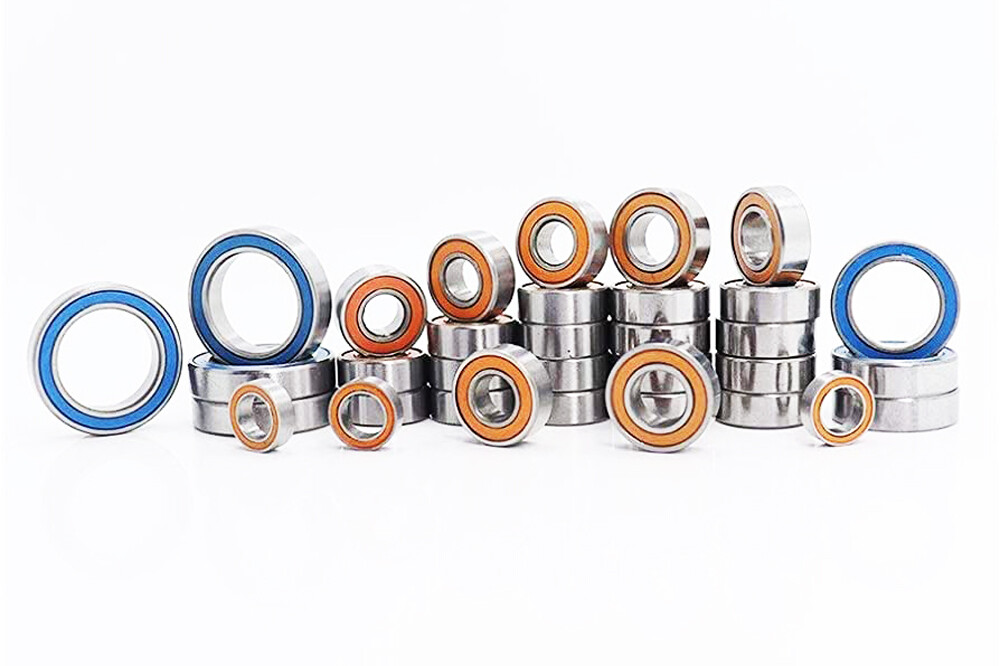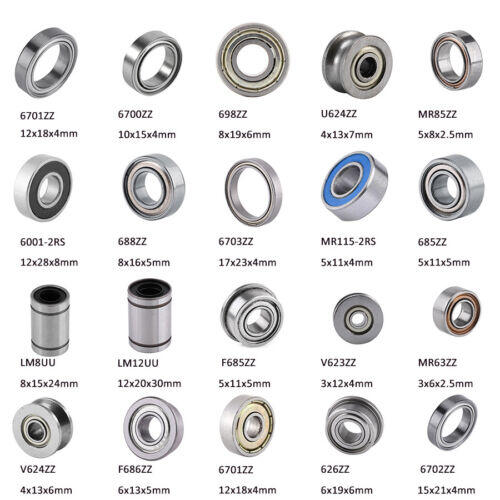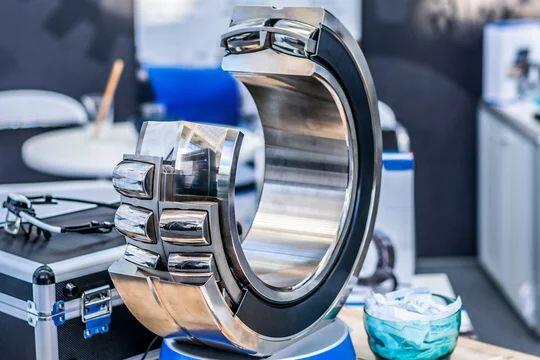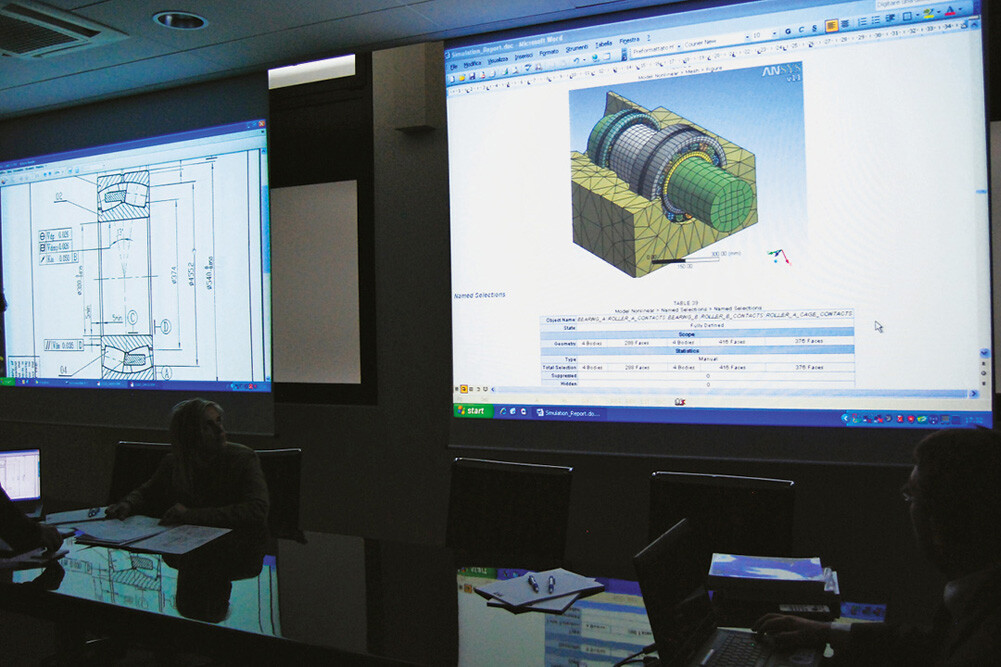
Bearing Manufacturer & Supplier
Specialize in ball bearings, roller bearings, thrust bearings, thin section bearings etc.
Everything You Should Know About Miniature Bearings
Miniature ball bearings, also known as precision ball bearings or instrumentation ball bearings, are small bearings used for very high speeds. The dimensions of these bearings allow them to rotate at high speeds with minimal vibration or noise.
Miniature ball bearings are used in a variety of applications as they help reduce friction between independently moving parts while also saving space in confined areas such as semiconductor equipment, medical applications, and instrumentation. These miniature bearings are usually machined and include inner and outer rings, snap rings, retainers, shields and balls.
Table of Contents
ToggleFeatures of Miniature Ball Bearings
Miniature ball bearings are available in different types and in different designs to meet the requirements of almost any precision instrument application. Some bearing types include high speed radial bearings, full complement ball bearings, radial cages, angular contact bearings, thrust bearings. Subminiature and miniature bearings are usually sealed with rubber seals and boots to prevent any possible lubricant leakage or ingress of dirt.
Type: radial, angular contact, full complementary, thrust, etc.
Material: chrome steel, stainless steel, ceramic hybrid, plastic, etc.
Accuracy: ABEC-1 to ABEC-9
Dimensions: Less than 1.2 inches (30mm)
Structure: standard, flange, extended inner ring
Measuring system: imperial, metric
Cage: crown, ribbon, rivets
Noise: Provides performance tests for noise and friction torque specifications.
Sealing type: open, sealed (rubber seal), shielded (metal shielded)

Some of the notable design attributes that allow precision ball bearings to deliver the desired results include:
Seals and guards for contamination protection
High tolerance levels required for precise applications
Friction and noise performance testing
Rigorous factory lubrication from a wide variety of lubricant stocks
Extended flange outer and inner rings to provide mounting capacity
Contact angle and radial clearance variations to meet different deflection requirements and application loads
Medical and industrial handpieces
Flow meters
Fuel controls
Gyros, synchros and servos
Motors
Cryogenic coolers
Pulmonary assist devices
Sealing and Lubricating
The most popular sizes of miniature and small bearings are also produced in sealed versions. These bearings with Z and ZZ are lubricated with high quality grease, lubricated for life and suitable for high speeds. Bearings with the suffix RS or 2RS have lip seals made of nitrile rubber on one or both sides. AUB bearing grease is a low-noise bearing grease thickened by 12-hydroxy lithium stearate. It is processed by a special process by adding antirust agents and antioxidants to highly refined mineral oil. Applicable temperature range -20 C – 120 C.
| Subject | Symbol | Description |
|---|---|---|
| Seal type | ZZ | Metal shields on both sides. |
| 2RS | Rubber seals on both sides. | |
| Z | Metal shield on one side. | |
| RS | Rubber seal on one side. | |
| Tolerances | P0 | Normal tolerance level. Is not indicated as a standard. |
| P6 | Greater tolerance level than P0. | |
| P5 | Greater tolerance level than P6. |
Typical Material
Miniature bearings are available in a variety of materials including stainless steel, chrome steel, ceramic and beryllium copper. The ideal choice depends largely on the application and, in some cases, budget. Let’s take a look at each:
Stainless steel – is the most popular material today. 440C is the preferred variety. Stainless steel bearings are hardened to a higher level, allowing higher speeds and load ratings. They also have excellent service life and corrosion resistance, making them ideal for medical and dental applications. In fact, any application where bearings may be exposed to various environments will benefit from stainless steel. Interestingly, overseas manufacturers tend to opt for slightly softer 400 series steels.

52100C Chrome Steel – For less threatening environments, 52100C Chrome Steel will get the job done for a better price than stainless steel. It is also softer than 440C and therefore easier to machine. It is ideal for light duty, medium speed applications such as vacuum motors. Low speed applications include computer fans and ATM printers. These are just a few of the many products that use chrome steel miniature bearings.

Ceramic-ceramic hybrid bearings are widely used in electric motors, aerospace applications, high-performance racing cars, laboratory equipment, underwater applications, and . Any application requiring higher speed, lower friction and longer life is an ideal choice for ceramic hybrid bearings. Due to their favorable properties, ceramic bearings are becoming and popular today. They are extremely lightweight, virtually impervious to the elements, and boast a longer lifespan than metal. All of these have a downside, however: Ceramic bearings tend to cost about twice as much as metal bearings. But for some applications, such as mission- and safety-critical applications in military and aerospace, reliability and longevity are important factors than the price tag. Another bonus is that they handle high speeds extremely well and require little to no lubrication. This makes them ideal for applications such as machine tool spindles, which often fail due to lack of proper lubrication.

Beryllium Copper (BeCu) – This material used to be popular but is now obsolete. The biggest benefit is its ability to conduct electricity, as well as good strength and hardness. However, when beryllium copper bearings are produced, toxic fumes are emitted. The risks and associated costs of processing them have increased significantly over the years, making their production even impractical.
What are the most important requirements for miniature bearings?
For miniature bearings, the important attributes are speed, accuracy and life. In addition, the quietness of the bearings at high speeds is imperative. They are designed to provide reliable high performance for moderate radial and thrust loads at low operating torques. Chrome steel is the most commonly used material for ball bearings because of its high load capacity and low noise characteristics.
Miniature/instrument bearings are not used in high load applications and stainless steel is used to manufacture many bearings due to the low amount of material used. Both stainless steel and chrome steel provide the user with a high strength-to-wear ratio which is critical for long life and efficient operation.
Let’s see the differences/similarities between stainless steel and chrome steel…
Temperature: Plain chrome steel miniature bearings can be used at a constant temperature of 120°C or at intermittent temperatures up to 150°C. Above these temperatures, the load carrying capacity of chrome steels will decrease. Through special heat treatment process and adding high temperature grease, AUB can also customize high temperature resistant miniature bearings.
Internal clearance: Internal clearance is the clearance between the outer ring, inner ring and rolling elements. Generally, the up and down movement of the outer ring relative to the fixed inner ring is called the radial internal clearance, and the left and right movement is called the axial internal clearance. Bearing internal clearance in operation is an important factor that has a significant impact on other factors such as noise, vibration, thermal and fatigue life.
About AUB Miniature Bearings
AUB has a large selection of miniature bearings, with than 5000 types to choose from. Close tolerances from ABEC-1 to ABEC-9 are generally available for most miniature products. Typical bore diameters for miniature ball bearings start at 3 mm, with an outer diameter of only 10 mm. Custom miniature bearings are available with bore diameters as small as 1 mm! Many are available in imperial and metric sizes in SV30 special stainless steel material (the common 400 and DD type stainless steel, 52100 chrome steel material is also available). Other major configurations of AUB include:
Open miniature ball bearings
Open, with extended inner ring miniature ball bearings
Shielded miniature ball bearings
Shielded, with extended inner ring miniature ball bearings
Sealed miniature ball bearings
Sealed, with extended inner ring miniature ball bearings
Flanged, open miniature ball bearings
Flanged, open, with extended inner ring miniature ball bearings
Flanged, shielded miniature ball bearings
Flanged, shielded, with extended inner ring miniature ball bearings
Flanged, sealed miniature ball bearings
Flanged, sealed, with extended inner ring miniature ball bearings
AUB Bearing has been focusing on miniature ball bearings for 21 years, and can effectively solve various problems encountered by customers in bearing applications. With thousands of bearings in stock, we can offer bearings that are rare in the market. We have extensive experience in international trade, and most of our products can be shipped to the United States the same day the order is received. From Tesla to NASA, our loyal customers love our variety of small bearings. Our miniature bearings are widely used in world-class products such as Mercedes-Benz S series center consoles.
Our company is not only a seller of miniature precision bearings, but also a manufacturer of miniature bearing solutions. We have a team of skilled engineers and a large service team. Our experts have rich end-user service experience and mature industry solutions, and can provide customized miniature bearing solutions according to your actual working conditions.



